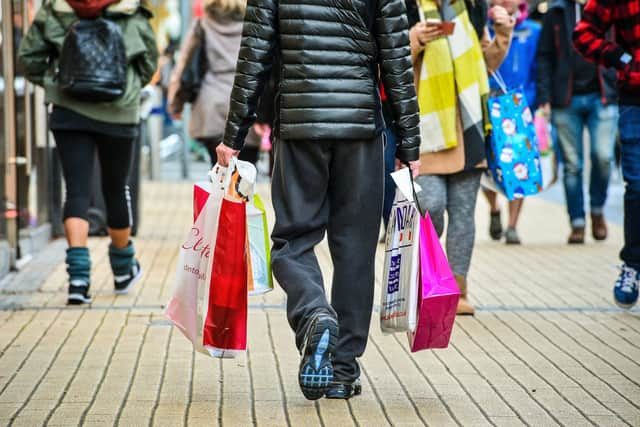Retail sector is closing 2023 on a glum note, says CBI economist
Many retailers feel gloomy about the sector’s prospects in the New Year, with firms anticipating an even sharper contraction in sales next month.
Retail sales volumes fell in the year to December at a faster pace than last month, with a weighted balance of -32 per cent from -11 per cent in the year to November, according to the CBI survey.
Advertisement
Hide AdAdvertisement
Hide AdMartin Sartorius, CBI Principal Economist, said: “The retail sector ended 2023 on a glum note, with the ongoing downturn in sales volumes deepening during the crucial holiday trading period. Looking ahead, retailers are bracing themselves for a New Year’s chill, as sales are set to fall at an even quicker pace next month. Strained household finances and higher interest rates continue to take a toll on consumer spending, suggesting that retailers will have to navigate a tough demand environment in the months to come.


"In this context, a hike in business rates for many retailers, alongside a rise in the National Living Wage, will heap more pressure on the sector in the new year.”
The CBI said internet sales volumes declined at a “firm pace” in the year to December (-41 per cent from -39 per cent in November), and look set to continue falling next month (-41 per cent). The survey included 129 respondents, of which 51 were retailers.
Earlier this week, data revealed that inflation dropped back unexpectedly to its lowest level for more than two years last month, prompting forecasts the Bank of England could start cutting interest rates early in 2024.
Advertisement
Hide AdAdvertisement
Hide AdOfficial figures showed falling fuel prices and another drop in food inflation drove the Consumer Prices Index (CPI) down to 3.9 per cent in November from 4.6 per cent in October, the lowest level since September 2021. Speaking earlier this week, the Chancellor Jeremy Hunt claimed the UK was “back on the path to healthy, sustainable growth” after the big fall in inflation.
He said: “With inflation more than halved, we are starting to remove inflationary pressures from the economy. Alongside the business tax cuts announced in the autumn statement, this means we are back on the path to healthy, sustainable growth.”
Grant Fitzner, chief economist at the ONS, said while inflation is now at a two-year low, “prices remain substantially above what they were before the invasion of Ukraine”.
The ONS data showed that falling prices at the fuel pumps helped bring down the rate of inflation last month, with the average cost of petrol dropping by 4.1p a litre between October and December, to stand at 151p last month.
Advertisement
Hide AdAdvertisement
Hide AdCPI was also pulled lower by another slowdown in the pace of annual food price inflation, which dropped to 9.2 per cent last month, down from 10.1 per cent in October, and the lowest rate since May last year.
Comment Guidelines
National World encourages reader discussion on our stories. User feedback, insights and back-and-forth exchanges add a rich layer of context to reporting. Please review our Community Guidelines before commenting.